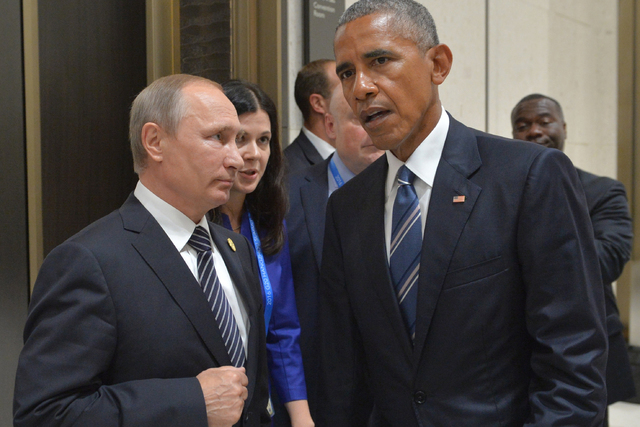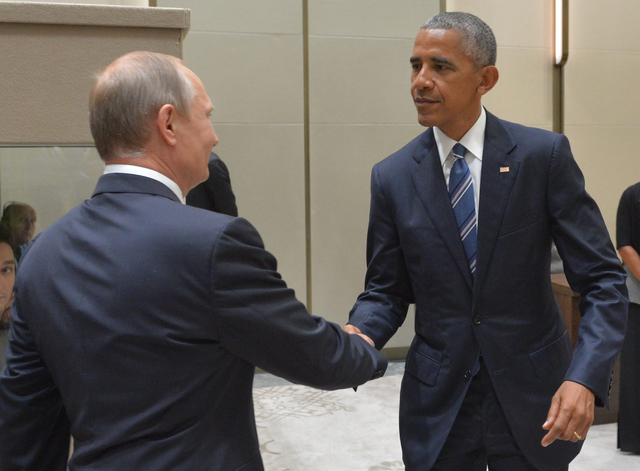Obama, Putin vow to keep working on cease-fire deal for Syria
HANGZHOU, China — President Barack Obama and Russian President Vladimir Putin on Monday failed to force a breakthrough in negotiations over a cease-fire for Syria, but agreed to keep looking for a path to provide humanitarian relief to thousands of besieged civilians in the civil war-ravaged country.
After a 90-minute huddle on the sidelines of an economic summit, the two leaders directed their top diplomats to return to talks quickly, likely later this week, according to a senior administration official who briefed reporters on the meeting. The official would not be named discussing the private discussion, which also covered U.S. concerns over cybersecurity and the situation in Ukraine.
The official said the U.S. was eager to find an agreement quickly, mindful of the deteriorating conditions around the besieged city of Aleppo. But U.S. was wary of enter a deal that would not be effective. The two leaders used the talk to clarify sticking points, the official said.
The conversation came hours after U.S. and Russian negotiators acknowledged that a recent round of intense talk had come up short. Secretary of State John Kerry and Russian foreign minister Sergey Lavrov have for weeks been trying to broker a deal that would curb the violence between the Russian-ally Syrian President Bashar Assad’s government forces and moderate rebels backed by the U.S.
The deal depends on the two sides agreeing to closer militarily coordination against extremist groups operating in Syria, something the Russians have long sought and the U.S. resisted.
Obama has expressed skepticism that Russia would hold to its agreement. The State Department has said it wants nationwide cease-fire between Assad’s military and the rebels, rather than another limited “cessation of hostilities” that has repeated failed in the past.
Obama’s meeting with Putin comes as the Russia leader is playing a prominent role in the presidential campaign at home. U.S. officials blame Russian intelligence for a hack on the Democratic National Committee that resulted in a leak of emails damaging to its presidential nominee Hillary Clinton. Putin has denied his government was involved, but cheered the release of the information.
The official said Obama raised concerns about cybersecurity issues with Putin, but would not detail the discussions.
Obama and Putin also discussed the conflict in Ukraine, where Russian-backed separatists have been fighting the government, and the implementation of the agreement to stop the violence, the official said. Obama met earlier with French President Francois Hollande and German Chancellor Angela Merkel on the same issue.
The difficult diplomacy on Syria set the tone for an uneven few days for Obama on his last tour through Asia as president.
Obama’s visit started on a high note, with the U.S and China consummating their unlikely partnership on climate change by announcing they were both entering the global emissions-cutting deal reached last year in Paris.
But the focus on climate quickly gave way to the failed Syria talks.
A sit-down between Obama and Turkish President Recep Tayyip Erdogan also laid bare the two NATO allies’ diverging interests in Syria, with Erdogan pointedly challenging Obama on U.S. support for Kurds fighting the Islamic State group in Syria. The Kurds are the most effective U.S.-backed anti-IS force, but the Turks consider them to be terrorists.
Obama’s meeting with Chinese President Xi Jinping also veered into delicate territory, with a lengthy White House description detailing how Obama had pressed Xi to abide by an international tribunal’s ruling against China over the South China Sea.
To the frustration of the White House, these weighty matters seemed to be overshadowed by a made-for-social-media moment from Obama’s arrival at the airport.
As the president was greeted by his Chinese hosts, Obama’s aides and journalists accompanying the president clashed with a Chinese official as they tried to watch the ceremony.
The tensions continued throughout the trip as Chinese officials severely restricted the media’s ability to attend Obama’s G20 events.
Obama was slated to leave China Monday evening, after a closing press conference. His next stop is Laos, where he’ll promote his effort to deepen ties to Southeast Asia.


















